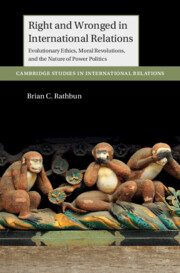 Right and Wronged in International Relations
Right and Wronged in International Relations Book contents
- Right and Wronged in International Relations
- Reviews
- Cambridge Studies in International Relations: 163
- Right and Wronged in International Relations
- Copyright page
- Dedication
- Contents
- Figures
- Tables
- Acknowledgments
- 1 The Nature in and Nature of International Relations
- 2 Lesser Angels
- 3 Mankind Is What Anarchy Makes of It
- 4 See No Evil, Speak No Evil?
- 5 To Provide and to Protect
- 6 Just Desserts in the Desert
- 7 Barking Dogs and Beating Drums
- 8 Biting the Bullet
- 9 Dying in Vain
- 10 Daily Bread
- 11 From Demonizing to Dehumanizing
- Index
- Cambridge Studies in International Relations: 163
6 - Just Desserts in the Desert
Fairness, Status, and Wilhelmine Foreign Policy during the Moroccan Crises
Published online by Cambridge University Press: 29 July 2023
- Right and Wronged in International Relations
- Reviews
- Cambridge Studies in International Relations: 163
- Right and Wronged in International Relations
- Copyright page
- Dedication
- Contents
- Figures
- Tables
- Acknowledgments
- 1 The Nature in and Nature of International Relations
- 2 Lesser Angels
- 3 Mankind Is What Anarchy Makes of It
- 4 See No Evil, Speak No Evil?
- 5 To Provide and to Protect
- 6 Just Desserts in the Desert
- 7 Barking Dogs and Beating Drums
- 8 Biting the Bullet
- 9 Dying in Vain
- 10 Daily Bread
- 11 From Demonizing to Dehumanizing
- Index
- Cambridge Studies in International Relations: 163
Summary
German insistence on a highly subjective understanding of fair treatment in early twentieth-century world politics is often mistaken for wanton status-seeking. I disentangle status-seeking from fairness-seeking by identifying where pure status-seeking versus fairness-seeking arguments diverge: the degree to which state actors demand exclusive rights and privileges. Feeling unjustly rewarded for its great power position, Wilhelmines leaders provoked two crises over the status of Morocco. However, at first, it did not seek any special advantages for Germany. Instead Germany sought the moral high ground by forcing the convocation of an international conference to settle the question of Western countries’ rights more generally. In the second crisis, Germany once again reacted strongly to increasing French influence in Morocco without the compensation that France had offered to other countries. I supplement these case studies with two survey experiments conducted in another suspected status-seeker, contemporary Russia. Respondents respond to status as unfair rather than a threat to Russian status, prefer a more inclusive organization that admits Russia but also other countries who deserve to be included by virtue of their GDP, and even indicate a willingness to exclude Russia when (manipulated) fairness dictates.
- Type
- Chapter
- Information
- Right and Wronged in International RelationsEvolutionary Ethics, Moral Revolutions, and the Nature of Power Politics, pp. 149 - 197Publisher: Cambridge University PressPrint publication year: 2023
